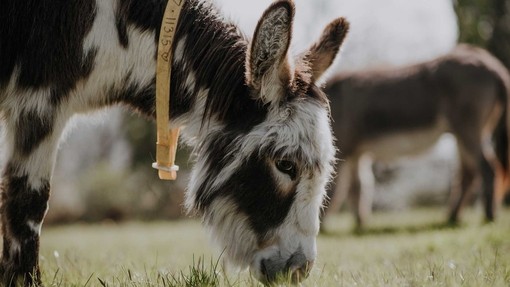How can the diet help a donkey with liver disease?
For a donkey with liver disease, the aim is to support the liver and improve its function as much as possible. Changes to the diet should still supply enough energy and protein to meet the donkey’s needs, but not so much that the liver is stressed.
Donkeys suffering from disease where the liver is still coping and regenerating (compensated liver disease) will generally show few obvious signs. Dietary changes are not normally required and donkeys should continue to be fed a high fibre, low energy, low sugar/starch diet along with appropriate vitamin and mineral supplementation.
Eventually, damage to a donkey’s liver can become so widespread that the liver is no longer able to compensate for the loss of tissue function. When this happens, the donkey may show signs such as weight loss and depression and blood test results are likely to show marked changes in liver function measurements. A supportive diet is important at this stage of the disease.
Which forage is best for a donkey with liver disease?
- If the donkey has no dental problems, provide free-access to fibrous, low-energy forages (such as cereal straw). This will allow a more natural trickle-feeding pattern, without too much risk of weight gain.
- Feed small amounts of higher energy forages (such as hay or haylage) when grazing is not available or is poor quality, or if the donkey needs to gain or maintain weight. Avoid legume forages (such as alfalfa), as they have a high protein content.
- If the donkey has dental problems, feed appropriate short chopped chaff products, instead of long-fibre forages. Avoid products based solely on alfalfa because, along with a high protein content, they can be more difficult to chew.
Is grazing suitable for a donkey with liver disease?
Allowing donkeys access to turnout is encouraged as it can provide mental and physical benefits. Unless the grazing is sparse or of poor quality restrict the quantity of grass that is made available by means of strip grazing or creating track systems.
Avoid restricting grazing by only allowing short periods of time. Sudden gorging on grass can disrupt the gut microbes leading to digestive upset and health problems (such as diarrhoea, colic, or laminitis). Sudden intake of excess protein by a donkey with severe liver disease can result in high blood ammonia concentrations. This can lead to neurological problems.
If the donkey suffers from photodermatitis, allow access to grazing at night rather than during the day, if possible.
What supportive supplements are best for a donkey with liver disease?
If the donkey is in good body condition, feed a supplement that:
- is formulated without cereal grains
- is low in-energy, protein, sugar, and starch
- includes essential amino acids
- contains supportive vitamins (particularly A, D, and E) and minerals.
If the donkey has a body condition score of 2 or less (on a five-point scale of 1-5), and is losing or not maintaining weight, feed a supplement that:
- has a moderate energy content
- is not based on cereal grain
- includes easily digestible, good quality protein rich in essential amino acids
- contains supportive vitamins (particularly A, D, and E) and minerals.
Key points when feeding a donkey with liver disease
- Feed the donkey a well balanced, high fibre diet with an energy content appropriate for their body condition, activity level and the time of year.
- Provide enough protein to prevent catabolism (breakdown) of body tissues but be careful not to exceed the donkeys daily requirement (approx 40g CP/100Kg bwt)
- Make sure the donkey has access to an appropriate source of fibre for at least 18 hours a day. Tricklefeeding is vital for donkeys with liver disease.
- If the donkey needs supplementary feeding for additional calories, divide the total amount fed into several (at least four) small feeds a day.
- Short chops (chaff), unmolassed beet pulp and fibre pellets are suitable where supplementary feeding is required.
- Monitor the donkey’s appetite closely to help detect early signs of hyperlipaemia, a potentially fatal condition. See Factsheet: Hyperlipaemia in donkeys for more information.
- If the donkey has no appetite, use ‘tempters’ to to encourage them to eat. Foods to try in small amounts include: grated or chopped apples or carrots, apple sauce, apple juice, mashed banana, peppermint cordial, fresh or dried mint leaf, fenugreek, ginger, or yeast extract. See Factsheet: Safe treats for donkeys for more information.
- Offer the opportunity to browse a safe hedgerow. A sick donkey may prefer this over any other offering. See Factsheet: Poisonous plants and trees for more information.
Things to avoid
- Periods of fasting. This will help prevent the breakdown of protein from body tissues.
- Feeding large quantities of protein-rich ingredients (such as alfalfa, soya, and linseed).
- Allowing the donkey to become overweight. Never put a donkey on a strict diet, this is dangerous and can lead to hyperlipaemia.
Things not to do
- Do not restrict protein intake excessively as this is likely to promote the breakdown of protein from tissues within the body and may lead to hepatic encephalopathy.
- Feed products high in iron or copper. Strictly avoid liquid supplements enriched with iron as these can accumulate in the liver, making disease worse.
- Feed supplementary feeds based on cereal grains. These can increase the risk of health problems (such as gastric ulceration, colic, and laminitis).




